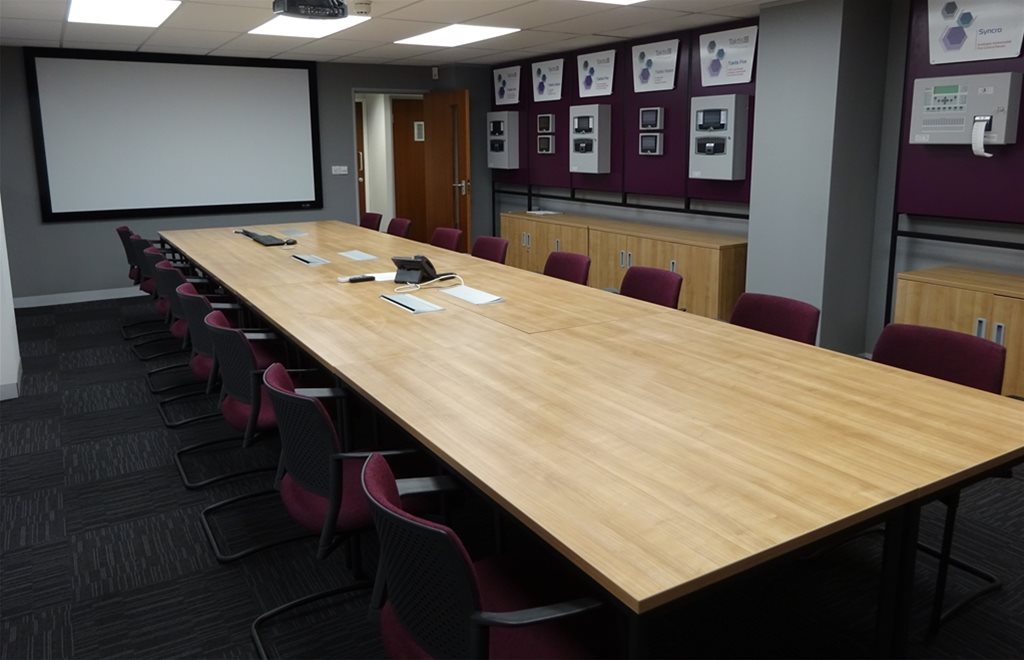Derrick Hall discusses the rising importance of installer training and reveals how it has still been safely delivered during lockdown
THE IMPACT of the Grenfell Tower tragedy on the fire safety industry has been significant, reaching far beyond the specific systems and materials deemed now to be at fault. It has brought about increased scrutiny on all works carried out in public buildings and a stronger culture of culpability for contractors, providing a tragic reminder that fire safety should never be an afterthought or considered in silo. Instead, it should be an integral part of the design of a building.
It is therefore the role of all fire safety manufacturers to provide the businesses that install their fire panels with detailed, robust and genuinely engaging training. This should give them the confidence and competence to specify systems that take into account the entirety of a building and the needs of their customers.
Fire panels are sophisticated systems which need to be properly understood if their true potential is to be realised. Looking at it another way, failing to understand the technology you are handling could lead to claims of negligence, should something go wrong. To this end in 2019, we launched the Kentec Installation Partner (KIP) scheme. It is a commitment to furthering standards and ensuring that we equip our installers with the necessary skills to make the most out of our systems.
While training modules cover all fire detection and extinguishant systems in our portfolio, the fire panel produced by Taktis is a priority for the scheme, as its advanced networking, remote monitoring, reporting and smart building integrative technologies require thorough expertise.
KIP scheme
The scheme provides registered customers with a wide ranging programme of bespoke training and expert technical support, as well as dedicated software and enhanced product functionality. It has been designed to further professionalism within the industry, and assure end users that their installations take best advantage of our most advanced and sophisticated panels. In addition, it provides access to our protected partner site, Virtual Resource, as well as Taktis LE2 commissioning software and enhanced bridge functionality – the solution for migrating Syncro panel networks to the latest Taktis technology.
This scheme has been designed to support legislation, as engineer competency is a requirement of BS 5839-1: 2017: Fire detection and fire alarm systems for buildings. Code of practice for design, installation, commissioning and maintenance of systems in non-domestic premises.
Within this standard, a ‘competent person’ is defined as someone with the relevant training, experience and access to the correct tools, equipment and information to carry out a defined task.
Installer support
Another scheme objective is enabling installers to demonstrate their capabilities within tenders and to their customers. Registered members are provided with certification logos, and their details are listed on our website to help provide end users with the assurances they require that the installer has been trained by the manufacturer.
Looking ahead, the next stage for the scheme plans to provide installers with what effectively works in the same way as a driving licence. A small card identifies the systems and software that the installer is trained to install. Also key to championing installers is the fact that we remain true to our ethos of supporting open protocols.
Training covers how systems integrate with third party devices, providing installers with the flexibility to design systems to maximise what is already installed (protecting legacy investments), as well as their own and end user preferences. This is especially useful within large and complex installations such as hospitals, airports, railway stations, academic institutions, industrial sites and shopping centres.
These are essentially sites spread over vast and sometimes disparate areas, yet where public safety is critical. They incorporate vast networks of fire panels and life safety systems, requiring the attention and knowledge of competent installers.

Training methods
In order to support such high levels of expertise, in the programme we have adopted the SMART (specific, measurable, achievable, realistic and timely) principal of training. This methodology allows us to focus training on the areas that are necessary. Goals set for attainment are measured and achievable, ensuring that training clearly relates to real world installations and detailing how much time will be required to instil training effectively.
The professional training process has been developed by personnel that have been chosen for their field experience, having full understanding of installation engineering, commissioning, technical support and product development, in addition to having gained specific training expertise.
Our current trainers have backgrounds in the Royal Navy and competitive sports worlds, providing useful transferrable structures and methodologies.
All introductory modules are in an e-learning format, enabling installers to work at their own pace and ensure that they have a good foundational knowledge before putting theory into practical modules.
Hands on, practical training allows our partners to literally test out panels that are designed specifically to the configurations of a building or site. Key to the training ethos is the fact that they can test out systems without any fear of making mistakes. When on site, an engineer may be understandably cautious about doing anything that could jeopardise the integrity of a system. This may lead them to take the simplest route that does not take full advantage of available capabilities.
In a training environment, they are given the opportunity to fully test the programming and configuration options in a safe manner, without risks or consequences.
The process of training begins with the more straightforward scenarios and becomes increasingly complex as it incorporates sector specific examples, until installers are equipped with a full understanding that can be replicated in any environment. Training modules are living documents that change and evolve as technology advances and reshapes.

Case studies – KIP training recipients
EA-RS FIRE Engineering Ltd has found the COVID-19 outbreak a good opportunity to invest in training. Its managing director Mark Wheeker commented: ‘We predict there will be a surge in business in coming months, with projects that were put on hold due to COVID-19 being re-scheduled. It therefore makes sense to use training to put the company in the strongest position to meet additional demand.
‘Creating the KIP scheme was a bold step for Kentec, acknowledging that a higher industry standard was required. It has been an important step in furthering the assurance we provide to end users that critical life safety systems are only being installed by fully-competent firms that have received training on the latest industry innovations. This ultimately ensures that life safety systems are optimised.’
Daren Pool, managing director of Triple Star Fire & Security Limited, joined the scheme as his business saw Kentec’s Taktis panel becoming increasingly prevalent: ‘Taktis has become one of our preferred panel choices for its networking capabilities and easy-to-use interface. As we are installing the panel into more and more customer sites, across a range of critical sectors, I felt it was important that me and my engineers fully understood the latest developments and full capabilities of the panel in order that our customers are able to realise its full potential.
‘The scheme has worked very well in providing us with full confidence that we are providing all our customers with this service.’
COVID-19 and lockdown
During the COVID-19 pandemic and also the global lockdown, when face to face interactions were not possible, we have had to adapt our training to ensure that there is no reduction in service. The challenge has been in providing hands on training while it is still not possible to have installers physically present in training rooms.
Video and document sharing platforms have been extremely useful in helping our company create ‘virtually practical’ training courses. Through webinars and virtual training, we have been able to demonstrate in great detail how systems work – taking them through the same processes as if they were present, highlighting the inner workings of a panel and as necessary demonstrating where it is possible to go wrong or to fail to use a system to its full capabilities.
Classroom training is now starting up again with reduced numbers, according to social distancing rules. It has been encouraging to observe that installers are still choosing virtual options in reference to on site training. Remote training continues to enable and encourage installers to ask questions, either during a live tutorial or subsequently, by means of the portal.
Through this portal, we can communicate directly with installers and point them to ‘how to’ videos. This is proving a valuable tool, which is prompting installers to ask questions without fear of losing face. It also facilitates a much greener learning experience, supporting environmental goals.
Another significant advantage is that it helps us to provide training further afield. Not only can we deliver training at short notice to installers on the other side of the country, but we are also expanding the scheme to include our wide network of international customers. We’re proud to now have more than 100 KIPs registered to the scheme; we have welcomed our first international KIPs from China and Europe, and look forward to delivering training across South East Asia and the Middle East.
Our registered KIP members span the entire professional lifecycle from engineers, technicians and apprentices to business owners with decades of experience, all of whom are seeking to ensure that their knowledge is current and able to take advantage of the latest technologies
Derrick Hall is director of sales at Kentec Electronics Ltd
